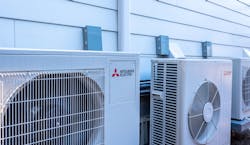From electric cars to induction cooktops, consumers are discovering how all-electric technology can provide a superior experience while improving sustainability. Going all-electric is easier than ever and there’s no better way to improve a home’s comfort and efficiency.
Many builders and contractors are looking to electricity for the next generation of homes and even renovation projects. With companies like Tesla backing the development of energy-efficient neighborhoods and legislation passing to “electrify everything,” homeowners are left to wonder — what’s in it for me?
The all-electric difference
Homes featuring today’s all-electric systems have moved beyond the technologies of yesteryear. For example, while many are familiar with electric baseboard heat, modern mini-split heat pump systems provide effective heating and cooling at a fraction of the energy usage.
Speaking of HVAC, these systems are often a builder’s first step in transitioning a home’s power source. Why? Heating and cooling can account for 42% of your utility expenses. Traditional, fossil-fuel burning heating and air-conditioning options only compound this with inefficient operation.
By just updating your HVAC system to an all-electric option, here’s what you can expect:
Personalized Comfort
Going all-electric doesn’t have to be a scary shift. Daily operation is probably much more “normal” than what you think (no solar panels or battery storage required)! Mini-split heat pump systems are zoned, meaning indoor units can be ducted or ductless, and are placed in various areas of your home, such as a basement, bedroom, kitchen and so on.
Instead of running like a furnace which switches on and off at full power to reach your desired temperature, heat pump systems fine tune the outdoor unit’s fan speed to meet the set point of active zones. In other words, the energy being used is minimized as the system prioritizes zones or rooms you’re actually using. Say goodbye to those pesky “hot and cold” spots within the home.
Electric = Efficient
At this point, you may be asking yourself, does electric always equal efficient? The easiest way to answer this is to review a system’s coefficient of performance (COP), a term your contractor might use when describing heating and cooling systems.
A heat pump can provide more energy as heat than it consumes in electricity. COP describes the amount of heat your system can provide compared to the amount of energy it uses at a given temperature. A COP of 1 would mean your system offers as much heat as it consumes. Modern heat pumps can offer COPs greater than 3 at 5° F, meaning they deliver three times as much heat relative to the energy used. The higher the COP, the better!
For added context, even today’s advanced furnaces can’t compete with heat pump performance. The most efficient fuel-burning furnaces are about 90% efficient. For every unit of energy going into operating the system, only 90% of the energy is produced as heat energy. High-efficiency heat pump systems can be 300% more efficient than these furnaces.
Wellness
Cost benefits, comfort and efficiency aside, your family’s wellness matters most. A lot of homes built in the last few decades were built quickly for quantity, not quality. As Millennials are currently the largest segment of the homebuying market, their need for wellness and sustainability is driving builders to follow suit. High indoor air quality is a major factor for today’s healthy homes. Installing or replacing current heating and cooling systems with high-performance mini-split heat pumps can provide peace of mind knowing fossil fuel combustion is out of your home. Not to mention, electric systems can contribute towards lowered carbon emissions, making for a better indoor environment and a better planet.
As the energy transition continues, it’s important to remember how upgrades or system swaps can make a lasting difference. To learn more about Mitsubishi's all-electric, mini-split heat pump system options, visit MitsubishiComfort.com.
